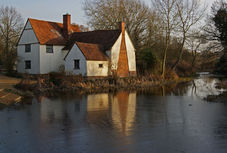- Protected Species Licensing
- Ecological Impact Assessment (EcIA)
- Ecological Research
- Sustainability
- Historic Buildings & Landscapes
- Renewable Energy
- Ecological Management Planning
- Ecological Clerk of Works
- Brownfield Regeneration
- Code for Sustainable Homes and BREEAM
- Entomology
- Wildlife Gardening
Historic Buildings & Landscapes
Historic buildings are often favoured roosting sites for bats. This can be for a number of different reasons including the presence of large roof spaces, attics, cellars, follies and ice houses, as well as the age of the buildings and the materials and methods of their construction. Large, uncluttered roof spaces within older buildings are often used for roosting by brown long-eared bats and less common species such as lesser horseshoe bats, and traditional building techniques often result in the presence of specific features such as stone tiled roofs, hanging tiles, wooden weather-boarding and mortice joints in wooden frames which crevice-dwelling species can use for roosting. Other factors which might influence the presence of bats include the ecological context of a building close to habitat features such as woodland, parkland and wetland.
Including bat surveys at an early stage of any plans involving historic houses or listed buildings is an essential factor of any plans involving an historic site. Our ecological consultants have been involved with many bat survey projects regarding listed and historic buildings within the South-East and the Heart of England.
Due to our geographic location in West and South Oxfordshire, we have tended to specialise in projects such as Cotswold stone barn conversions, alterations to large Cotswold houses and traditional flint-and-brick houses of the Chiltern Hills. Church projects involving bat surveys are also a particular specialism and we have been involved in undertaking bat surveys and preparing bat mitigation schemes for a number of church repair projects, including works to lead and tiled roofs, church porches and towers.
Recent projects involving churches include:
- St. Alban’s Cathedral, Hertfordshire – Phase 1 Habitat Survey & Bat Survey
- St. Peter’s Church, Little Wittenham, Oxfordshire – Bat Survey
- St. Nicholas’ Church, Kiddington, Oxfordshire – Bat Survey
- The Church of St. George the Martyr, Wash Common, Berkshire – Bat Surveys & Bat Mitigation Strategy
- The Church of St. Mary the Virgin, Witney, Oxfordshire – Bat Surveys & Ecological Clerk of Works
Recent projects involving historic houses and landscapes include:
- Blenheim Palace, Oxfordshire
- Hampton Court Palace, Surrey
- The Bedford Estate, Woburn Abbey, Bedfordshire
- The Shotover Estate, Oxfordshire
- The Nettlebed Estate, Oxfordshire
- Hawridge Court, Buckinghamshire
- Wysdom Hall, Oxfordshire
- Flint Hall, Buckinghamshire
- Rendcomb College, Gloucestershire
Projects involving ecology surveys and historic landscapes include Windsor Great Park, Hampton Court Palace, Icomb Place, Ditchley Park and Blenheim Palace. At these sites, the ecological projects have included Phase 1 habitat surveys, bat surveys, tree climbing surveys for roosting bats and pond surveys for great crested newts.
Related surveys
Related content
- Bat Survey in Berkshire
- Bladon Dam, Blenheim Palace Estate, Oxfordshire
- Church of The Holy Cross, Bedfordshire - Bat Survey
- Coventry Cathedral Ecology Assessment - Habitat, Bat & Bird Surveys
- Forty Hall, Enfield, London - Bat Surveys of Trees
- Kingham, Oxfordshire - Preliminary Bat Survey
- St. Mary’s Church, Oxfordshire - Bat Surveys
- The Tiltyards, Hampton Court Palace - Habitat Survey
- Woburn Abbey, Bedfordshire - Bat Surveys with Tree-Climbing
- Woodgate Barn, Monk Sherbourne, Hampshire - Bat Survey
The Windrush Innovation Centre, Howbery Park, Benson Lane, Crowmarsh Gifford, Wallingford, Oxfordshire OX10 8BA
Hexagon Business Centre, Avenue 4, Station Lane, Witney, Oxfordshire OX28 4BN
Tel: 01491 822681
Tel: 01993 220273
Copyright ©2026 Windrush Ecology Ltd.
Email: enquiry@windrushecology.com









